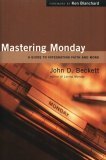Spiritual Futurists: Joy Connoisseurs (Philippians 4 Sermon Notes)
Sermon Notes / Produced by The High Calling
Philippians 4:4-7 (NIV)
“Rejoice in the Lord always. I will say it again: Rejoice! Let your gentleness be evident to all. The Lord is near. Do not be anxious about anything, but in everything, by prayer and petition, with thanksgiving, present your requests to God. And the peace of God, which transcends all understanding, will guard your hearts and your minds in Christ Jesus.”
Theological Point
Christians can rest secure in the fact that joy dominates our future. We are destined for a place where there is no more darkness, pain, or tears. But the teaching of the New Testament is that joy is not simply something we must wait for, in a “land that is fairer than day” in “the sweet by and by.” Joy is the believer’s present imperative as well as future inheritance.
Introduction
TGIF: Thank God it’s Friday. That’s a common enough expression. But how often do you hear, “TGIM – Thank God it’s Monday”? The truth is that, increasingly, the pressure of a competitive workplace and a frantic family schedule is siphoning off the contentment that adults experience, especially Monday through Friday.
Illustration: The March 26, 2009, edition of Newsweek magazine cites a “Families and Work Institute” survey that 60% of men report “some” or “a lot of” stress related to workplace-family life balance (a 25% increase from the late 1970s). The number for women has stayed virtually the same during this same period—around 45%. For Christians, this statistic is especially tragic, because we of all people are called to be those whose lives are characterized by peace and joy. From an eschatological perspective, joy is our destination. And even for those of us on this side of heaven’s shores, Christians are still promised, as the hymn writer puts it, “a foretaste of glory divine.”
Joy is the hallmark of Paul’s letter to the Philippians and the subject matter for this brief but robust passage of Scripture.
Our calling is to drink up joy wherever we find it.
The truth of this passage is that Paul is calling on us to be joy connoisseurs. We are to drink up joy wherever we find it. For the Christian, joy is not optional. In verse 4, Paul commands that we rejoice. Now, we might say to Paul, “Well yes, Paul, I am hopeful that the Lord blesses me in such a way that I will find joy.” But that is not what Paul is telling us. Paul is not wishing us good luck and hoping that we find joy. Paul is commanding us to abide in God in such a way that, in every situation, we drop down a bucket into the deep well of God’s grace. We don’t rejoice in happiness, neither do we rejoice in sadness, we rejoice “in the Lord”! And we rejoice in him always, regardless of our circumstances (keep in mind that Paul wrote this most joyful letter from prison).
As a young Christian, I remember being profoundly impacted by a sermon by Charles Spurgeon, in which Spurgeon referred to Jesus’ healing of the man with a withered hand (Luke 6:10). Spurgeon noted that Christ does not heal the hand first, but commands the disabled man to “stretch forth” his hand (a seeming impossibility). Spurgeon notes:
Suppose he [the disabled man] had cried out, “Sir, I cannot”; his withered arm would have hung dangling at his side till he died. But instead of that the command came; the man had the will to obey, and suddenly he had the power, for he stretched out his withered hand. What say you, did he stretch out that hand of his own might! No, and yet he was commanded to do it. And so if you are willing to believe, if now your hearts say, “I would believe, I would repent,” the power shall come with the will, and the withered hand shall be stretched out (emphasis added). (From a Charles Spurgeon sermon on 1 Kings 17:16, entitled, "The Inexhaustible Barrel.")
We cannot wait to feel joy, Spurgeon might say to us today. If we do, we might be waiting, helpless, for a long, long time. No, the power from God accompanies the resolve to rejoice in all circumstances, good and bad.
And in case we think we misheard Paul (after all, who can find joy in every situation?), Paul repeats himself: “I will say it again: rejoice!” In other words, Paul is calling upon us to become connoisseurs of the deep joy that Christ Jesus provides in every situation. Sometimes, that joy comes in gratitude for the manifold blessings that are ours. Sometimes, paradoxically, that joy comes in the midst of pain, when we learn Job’s secret: “I know that my Redeemer lives, and that in the end he will stand upon the earth” (Job 19:25). We trust in the triumph of our Redeemer over all the sources of our suffering, knowing that he will stand with us, even as our world is falling apart. Perhaps that’s why Karl Barth, in his commentary on Philippians, called the recurring theme of joy in Paul’s letter a defiant “Nevertheless!” As if to say, “Life is painful, and discipleship is hard; NEVERTHELESS, God is on our side, and we will rejoice!”
When we are drinking up joy in every situation, people will be able to tell. When I am drinking in stress, I respond with impatience, snapping at people that I love. General irritableness carries the day. When I’m consistently gulping down joy, what people experience in me is “gentleness.” As verse 5 puts it, my gentle attitude is evident to all who come in contact with me.
Still unconvinced? Paul reminds us at the end of verse 5 that “the Lord is near.” The apostle may be consciously echoing Psalm 145:18, “The Lord is near to all who call on him.” Through the presence of the Holy Spirit, we have access to the joyful presence of God in every trial. But I rather believe the apostle is making an eschatological point. The coming of the Lord is close at hand.
Illustration: Students can endure the pain and stress and exertion and sleepless nights of final exams, if they know that Christmas break is near. A Christian, who knows that joy awaits us in heaven, finds strength to endure the present stress of life’s examination.
Our joy is too often spoiled by worry.
But there’s something in me that wants to say, “That’s all well and good, Paul. But worry and anxiety have drained every bit of joy out of my cup. There’s a hole in the bottom of my goblet.”
At this point, the preacher may want to make a point about his or her own personal worries—about money, about health issues, about the future, about children or grandchildren, about the state of the church, about the state of the world.
Most of us don’t intentionally choose to worry—worry seems to choose us. In verse 6, Paul takes this threat seriously. Just as he commands us to rejoice, he commands us to stop worrying. Even better, he exhorts us to turn our worries into prayer requests. There is no worry too small to turn into a supplication. And yet, Paul reminds us to wrap each prayer request about some source of anxiety in the wrapping paper of thanksgiving. Paul reminds us that, even in the midst of worry, we can be thankful for God’s presence, God’s provision, and God’s ultimate victory in the struggle of life.
Illustration: When my children were little, I used to note that one of my main jobs as their dad was to carry stuff. It would not be at all unusual for me, at a soccer game, say, to find myself walking around with Jack’s jacket, Drew’s candy bar wrapper, Timothy’s half-drunk juice box, and Laurel’s baby doll. My children felt very free to give me the stuff they no longer wanted to carry. Should I not treat my Heavenly Father the same way? What is stopping me from saying, “God, would you mind holding this worry for me?”
When we turn our worry into prayer, God’s peace guards our joy.
When we wrap up our worries in the paper of gratitude and present them to God, an amazing transformation happens. God’s peace stands guard over our souls and guards our joy. The peace of God stands guard like a sentry. In his commentary on Philippians, Gordon Fee describes how vital it is that we live out the truth of Paul’s passage. The spirituality of joyful living, Fee has said, “is very often the key to effective evangelism. In a world where fear is a much greater reality than joy, our privilege is to live out the gospel of true shalom, wholeness in every sense of that word, and to point others to its source.”
Our peace and joy only increase as we contemplate the fact that the “Lord is near.” We can be confident that one day, as Vance Havner once put it, “all question marks will be straightened into exclamation points, sorrow will change to singing, and pain will be lost in praise.” (Vance Havner, Playing Marbles with Diamonds).
Conclusion
Illustration: In the movie The Lion King, a young lion named Simba, the son of the late King Mufasa, was instructed by his professors, Timon and Pumba, on the art of handling worry. Their prescription: Hakuna Matata, a Swahili phrase which means “no worries.” It was a problem-free philosophy, a holiday from the stress of being king. Simba enjoyed this strategy for a while, a strategy of avoidance. He enjoyed it, that is, until his girlfriend Nala reminded him that he was running away from his responsibilities as king.
You and I are sons and daughters of the King as well. And our royal birthright is joy. This joy is best protected not by temporarily ignoring the source of our worries, but by giving our worries back to God, as we “tell God every detail” of our needs (J. B. Phillips paraphrase). We give him our worries, and he sends in his peace to stand guard over our joy. This “joy of the Lord” is truly “our strength” (Neh. 8:10)!
Connection to Faith and Daily Life
Workplace worries abound—anxiety over performance reviews, job loss, hiring freezes, difficult bosses, and irresponsible employees. One faith-filled application of this sermon would be to encourage people to draw a line down the middle of a piece of paper. On one side of the page, list the worries that dominate our work, family, and private lives. And then, on the right side of the page, for each discrete source of anxiety, write a corresponding prayer request (wrapped in thanksgiving for God’s future help).
******************************************************************************
Larry Parsley grew up in Corpus Christi, attended Baylor University (BA in ’84, Ph.D in ’96), and Southwestern Baptist Theological Seminary (M.Div in ’87). Currently, he serves as the Senior Pastor of
Valley Ranch Baptist Church in Coppell, Texas (a suburb in northwest Dallas). Larry and his wife, Jaletta, have three sons and a daughter.
Click here for a PDF of this sermon.
Other sermons in the series Spiritual Futurists:











